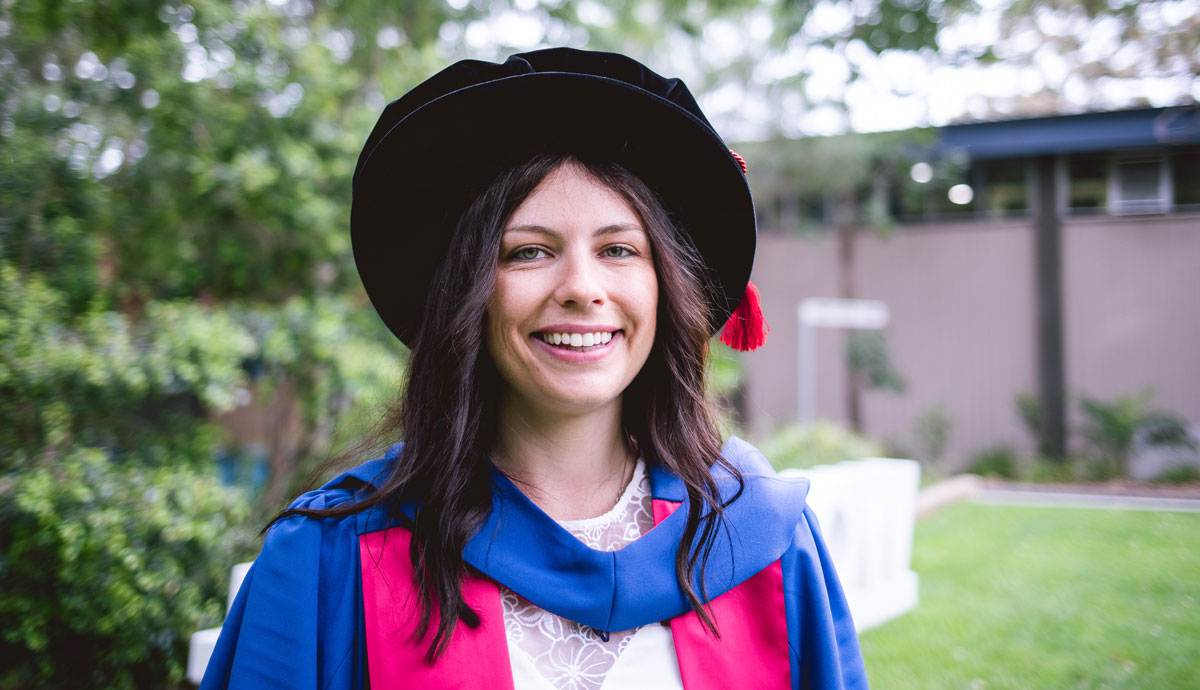December 12, 2018
Solar Decathlon sparked Emily’s passion for sustainability
PhD graduate working towards creating sustainable building hub in the Illawarra
The past few months have been a whirlwind for Emily Ryan. As part of the team from the University of Wollongong that competed in the Solar Decathlon Middle East 2018, she has spent much of the tail-half of the year immersed in the project, both in Australia and Dubai.
And just three weeks ago, , which sees student-led teams design and completely construct a sustainable house.
Now, Emily is graduating from UOW with her PhD, the end of a four-year journey that has closely aligned with her role on Desert Rose – which takes it names from the flower that flourishes in challenging environments.
“We are still in shock and very excited by our placing in the competition,” Emily said, from Dubai, where she spent two months helping to construct the house in her role as Operations Manager for Team UOW.
Emily graduated today (Wednesday 14 December) with a Doctor of Philosophy from the Faculty of Business, after also completing her Bachelor of Commerce (Honours) at UOW.
In fact, it was her work on the first award-winning Solar Decathlon in 2013, the Illawarra Flame House, that sparked the direction of her studies.
“In 2013 I joined UOW’s first Solar Decathlon team for the competition in China. This is where my passion for sustainability began to grow as I was exposed to the various businesses within the Illawarra who were all working towards a more sustainable future,” Emily said.
“After completing my Honours in 2014 in Supply Chain Management, I commenced my PhD with the Faculty of Business in 2015 with a goal to understand how businesses within the Illawarra region could work together to make the Illawarra a hub for the sustainable building industry.”
Supply chain clusters refer to businesses that are interconnected and all work together on a complementary project or goal. The benefits are great, as clusters reduce logistical needs, increase collaboration and promote growth for the region.
“Working in close proximity, these businesses increase their sustainability by focusing on local expertise and resources, rather than working with partners and industry further away,” said
Emily, who began to work with businesses in the region on how they could develop a local cluster.
“Focusing on the need for collaboration, increased networking opportunities and a supply chain cluster champion, development of a cluster is possible. With a great collaborative expertise in sustainability, the Illawarra is poised to develop a strong reputation for sustainability and housing of the future.”
At the same time as she was delving deep into her research, Emily was quietly working behind the scenes on the Desert Rose.
“In 2016, along with my colleague Clayton McDowell from the Sustainable Buildings Research Centre, we approached UOW about entering the Solar Decathlon Middle East 2018. After a number of meetings and planning sessions, we managed to convince enough staff and students to join our journey and thus the Desert Rose House was born.
“We have worked tirelessly over the past two years to design, build and communicate the Desert Rose House. I took the role of Operations Manager, running our day-to-day operations as well as procurement and logistics planning.
“The last two years has been a huge whirlwind of action in both my PhD and the Solar Decathlon. We’ve had many highs and lows but it’s such a unique experience, I wouldn’t trade it for anything. That sense of achievement when my PhD was accepted was absolutely amazing, matched only by the feeling when we were announced as second place winners in the Solar Decathlon.
“It’s been a crazy ride but all incredibly worth it.
“Throughout the course of the project, many of the contacts I have made during my PhD have gotten involved in supporting Team UOW and many of the skills I have learnt through the Desert Rose project I have been able to translate as a I communicate with industry.”
Juggling both projects has been tough at times, but the overlap between the two projects has helped Emily immensely and also reaffirmed her passion for her research direction.
Four years after beginning her PhD, and just a few weeks after Team UOW took out second place in Dubai for Desert Rose, she is more passionate than ever about the Illawarra’s potential to become a sustainable building hotspot. And she is looking forward to playing a role in it.
“Completing my PhD while working on the Solar Decathlon has been really challenging,” she said. “I have worked hard to balance my studies with my commitment to the Desert Rose project. Luckily, the people I have worked with during my studies and involvement in the project have overlapped as I have been able to share my knowledge with them to improve their operations and likewise their advice has shaped my findings.
“I am very passionate about creating a sustainable future and would love to see the Illawarra as a supply chain cluster on the map for our expertise and resources in sustainable buildings.
“We have the Sustainable Buildings Research Centre, we have the expertise in our industry and now our students following the Solar Decathlon. This is the future for the Illawarra.”
